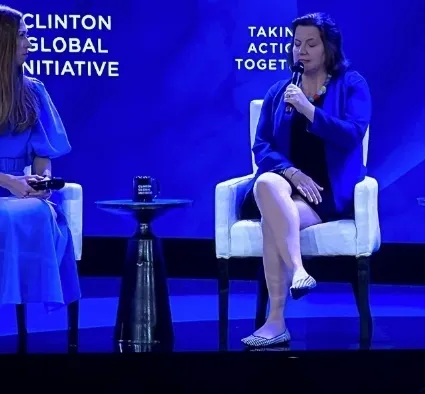“If flexible finance is what it takes to scale innovation, then where is the “F” in the broader ESG movement? Why aren’t we demanding more of it?”
I had the unique opportunity to participate in the Clinton Global Initiative (CGI) summit in NYC last week. Over 2,000 individuals gathered to discuss and contemplate various commitments to global action, including how to move the needle on various socio-economic disparities arising from climatic devolution.
Commitments to Action (CTAs) are pledges of impact by various non-profits, and private and philanthropic agencies – all focused on helping to solve pressing global, environmental, and social issues. These CTAs complement a greater embodiment of ESG behavior that, one can only hope, will continue to be at the forefront of mainstream organizational and corporate culture.
The Summit provided an opportunity for organizations and companies to exchange actionable solutions for climate disparities. Ideas, and corresponding actions, stemmed from accelerating carbon sequestration efforts to scaling clean water access to growing more abundant and healthy food in seemingly inhospitable areas.
Yes, political summits can be a lot of talking heads, but in a time when words tend to get “washed,” it was refreshing to witness more organizations and companies taking deliberate action to help solve complex environmental issues. Large or small, taking action matters. So, what will it take to achieve impact and scale in this work? The Summit proved a cornucopia of ideas, but one theme that echoed across sectors was the need for philanthropy to reimagine how they invest.
Environmental organizations, like water.org, founded by actor Matt Damon, noted they need flexibility to test ideas and take risks – all of which can help scale impact. However, the traditional form of philanthropic investment tends to overly favor highly measurable and (often) administratively burdensome outcomes, meaning non-profits spend more time on reporting versus innovating and deploying programs.
This traditional investment approach may inadvertently stifle innovation, as it does not encourage new ideas and may limit the ability to achieve scale. As such, environmental pioneers are advocating for a new investment mindset, including “trust-based” philanthropy. This type of investment approach is not a new concept, thanks to investors like McKenzie Scott. But why is this mindset not more mainstream across giving sectors? If flexible finance is what it takes to scale innovation, then where is the “F” in the broader ESG movement and why aren’t we demanding more of it?
Finally, what the CGI summit drove home was the notion that no one sector can solve our complex social and environmental issues alone. We will need pronounced public-private partnerships acting at the local, national, and global levels. As participants noted, “one sector cannot simply do it alone.” This work requires pronounced multi-sectoral relationships, all of which move at the speed of trust. If we want to accelerate the speed by which we achieve impact and scale to environmental challenges, then we need to strengthen relationships between sectors. Simply put, to scale and sustain more calls to action we need clearer paths to forging more public-private partnerships. It will be interesting to see if the next global initiative summit does just that…
For more info, visit: the Clinton Global Initiative
A big thank you to Caitlin Cain, President of Cain & Co and Vice President, of Local Initiatives Support Corporation for sharing this piece and the accompanying photos. She attended the University of Toronto, Trinity College, and is a classmate of YY Founder, Lisa Annabel Ellis.

Chelsea Clinton, sitting next to Eliza Reid, co-founder of Iceland Writers Retreat, author of Secrets of the Sprakkar: Iceland’s Extraordinary Women and How They are Changing the World. She’s also the First Lady of Iceland! Eliza attended the University of Toronto, Trinity College, and is a classmate of YY Founder, Lisa Annabel Ellis.

John Kerry, the first U.S. Special Presidental Envoy for Climate

Hilary Clinton and Janet Yellen, US Treasury Secretary


Kaitlyn D’Lima holds both a Bachelor of Business Administration and a Master of Science and Sustainability Management degree from the University of Toronto. She is also trained in greenhouse gas (GHG) accounting.
She brings extensive experience in sustainability and business transformational projects. She is known for her ability to execute projects of any size with both urgency and accuracy. Kaitlyn has a natural talent for improving stakeholder engagement. She’s a real trailblazer when it comes to benchmarking and research.
Kaitlyn is a runner who participates in outdoor adventure races.

Arun B Pazhayannur holds a degree in mechanical engineering and is a Chartered Accountant. He also has an MBA from the Ivey Business School at the University of Western Ontario. Along with his academic achievements, he has a thorough knowledge of Environmental, Social and Governance (ESG) principles, which he incorporates into his consulting work.
Arun is well-known for his leadership abilities as well as his strong skills in data analysis, financial modeling, and operations management. He has been recognized for his ability to identify practical solutions and deliver value to clients ranging from banks to payment companies to software providers. Arun is also a past President of Toastmasters Club.
In his free time, Arun enjoys scuba diving.In his spare time, Arun likes to scuba dive.

Gregory Donovan is a Chartered Accountant. He is a Fundamentals of Sustainable Accounting (FSA) Credential Holder. He obtained an Honours in Business Adminstrations (HBA) from the Ivey Business School (Western University) and a Master or Laws (LLM) from the London School of Economics. Gregory is the CEO of Avondale Private Capital, a sustainable finance firm focused on energy transition finance and carbon markets. He has presented on these topics at conferences in Canada, the US and UK.
Greg participates in the occasional triathlon and loves to go skiing and sailing with his two young children.

Margaux Loptson holds a Bachelor of Arts (Psychology) and a Bachelor of Arts (Criminology) from Pennsylvania State University. In addition, she holds several research certifications, including Ethical Conduct for Research Involving Humans.
She has been an essential player in AI-powered teaching and learning projects as a User Experience (UX) lead. Margaux is known for applying her design thinking, problem-solving and analytical skills to make a positive impact. She is a native French speaker.
Margaux is a fitness enthusiast who can be found hiking around Central Park in NYC.

Ritika Jain holds a Masters in Environmental Sciences, Policy and Management from Lund University (Sweden) and a Bachelor of Technology from Indraprastha University (India). As a lifelong learner, she is pursuing a Graduate Diploma in Corporate Social Responsibility and Sustainability at the University of Toronto.
Ritika is a recycling and responsible supply chain specialist. Through her work, she collaborates with organizations to implement circular economy focused policies to ensure compliance with regulations.
Her proficiency in data analytics and with the Global Reporting Initiative (GRI) enable her to manage complex sustainability data. Ritika also volunteers with the UN Sustainable Development Solutions Network, engaging with youth to drive positive change.
Ritika is a native Hindi speaker. She is a certified hiking leader who enjoys travelling.

Jonathan Spence holds an Honours Bachelor of Integrated Sciences (Earth and Environmental Sciences) from McMaster University and has his certification in Geographic Information Sciences from the ESRI Canada Center of Excellence at McMaster University. Jonathan worked as a research analyst in the environment and sustainability group for a TSX listed company.
He is pursuing his Ph.D. in Earth and Atmospheric Sciences at the University of Alberta, where he is researching the development of carbon capture techniques and their applications to the mining industry. Jonathan is focused on helping companies to minimize their carbon footprint while supporting their economic growth.
Jonathan is an avid water polo player and coach. He plays for the local National Championship League team.

Gurnoor Gandhi holds an MBA from Ivey Business School (Western University) and a postgraduate diploma in Maritime Energy Management (Sweden). Gurnoor brings experience with sustainability frameworks including TCFD, GRI, and CDP and is pursuing FSA credential (SASB).
Gurnoor has global leadership experience in the shipping industry managing assets worth millions of dollars on the high seas and has led diverse teams worked in Monaco, Singapore, and India. Most recently, he led organizational development and client partnerships at CARD, a non-profit focused on rural development and renewable energy.
Gurnoor brings a blend of technical and leadership skills. He applied his knowledge of greenhouse gas accounting and carbon capture to support clients with niche energy transition projects. He is known for putting his problem-solving, stakeholder management, and project management skills to work to help firms expedite their ESG Journey.
Gurnoor is a certified BMW adventure motorcyclist who finds off-road rides rejuvenating for body and spirit. He enjoys hiking with his family.

Lisa Annabel Ellis holds an Honours Bachelor of Science (Environmental Science) from the University of Toronto and an MBA from the Ivey Business School (Western University). She is a certified Project Manager Professional (PMP) with a Six Sigma Green Belt. Lisa is a Fundamentals of Sustainable Accounting (FSA) Level II Candidate. Applying her deep expertise in business and operational strategies, she has led award-winning transformational initiatives.
Drawing on her well-rounded science and finance expertise, she launched YellowYellow to help clients advance their sustainability practices. As an advocate of transparency and good governance, she partners with clients to understand their risks and opportunities to generate superior long-term value. Stakeholders across the value chain recognize the impact of this effort. She has been called upon to be a keynote speaker and lecturer.
Lisa is an advanced scuba diver who enjoys most water-related sports.